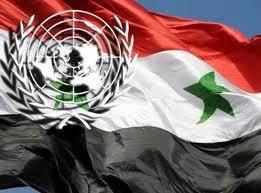The U.N. Security Council unanimously passed a landmark resolution Friday ordering the destruction of Syria’s chemical weapons and condemning a murderous poison gas attack in Damascus.
 he U.N. Security Council unanimously passed a landmark resolution Friday ordering the destruction of Syria's chemical weapons and condemning a murderous poison gas attack in Damascus.
he U.N. Security Council unanimously passed a landmark resolution Friday ordering the destruction of Syria's chemical weapons and condemning a murderous poison gas attack in Damascus.
The major powers overcame a prolonged deadlock to approve the first council resolution on the conflict, which is now 30 months old with more than 100,000 dead.
U.N. leader Ban Ki-moon, a critic of the council's paralysis, called the resolution "the first hopeful news on Syria in a long time." Ban also said he hopes to convene a peace conference in mid-November.
Resolution 2118, the result of long negotiations between the United States and Russia, gives international binding force to a plan drawn up by the two to eliminate President the Syrian chemical arsenal.
There are no immediate sanctions over a chemical weapons attack confirmed by the U.N. But it allows for a new vote on possible measures if the Russia-US plan is breached.
U.S. Secretary of State John Kerry hailed the resolution but warned of other consequences should the Syrian government fail to act.
For his part, Russian Foreign Minister Sergey Lavrov stressed that there were no automatic punitive measures and that the resolution applied equally to the Syrian opposition, stating that the council would take "actions which are commensurate with the violations, which will have to proven 100 percent."
The resolution "condemns in the strongest terms any use of chemical weapons in the Syrian Arab Republic, in particular the attack on August 21, 2013, in violation of international law."
For his part, Russian Foreign Minister Sergey Lavrov stressed that there were no automatic punitive measures and that the resolution applied equally to the Syrian opposition, stating that the council would take "actions which are commensurate with the violations, which will have to proven 100 percent."
Charter VII can authorize the use of sanctions or military force. But diplomats said Russia would fiercely oppose any force against its ally. All sides agreed that new action will require a new vote.
The resolution also expressed "strong conviction" that those responsible for chemical weapons attacks in Syria "should be held accountable."
It formally endorsed a decision taken hours earlier in The Hague by the Organization for the Prohibition of Chemical Weapons (OPCW) to accept the Russia-U.S. disarmament plan.
The plan called for Syria's estimated 1,000 tons of chemical weapons to be put under international control by mid-2014. Experts say the timetable is very tight.
UN Secretary General Ban Ki-Moon said the resolution "will ensure that the elimination of the Syrian chemical weapons program happens as soon as possible and with the utmost transparency and accountability."
Ban also told the Security Council he wanted to hold a new Syria peace conference in November. He will start contacts with his Syria peace envoy Lakhdar Brahimi next week on setting the firm date and who will attend the new meeting, diplomats said.
The Security Council resolution gave backing to the 2012 conference declaration, which stated that there should be a transitional government in Syria with full executive powers.
It also determined that the new peace conference would be to decide how to implement the accord.
A car bomb north of Damascus that killed at least 30 people earlier in the day and 11 more deaths in a government air raid highlighted the continued slaughter in Syria's long-running civil war.
"We must never forget that the catalog of horrors in Syria continues with bombs and tanks, grenades and guns," said Ban.
"A red light for one form of weapons does not mean a green light for others."